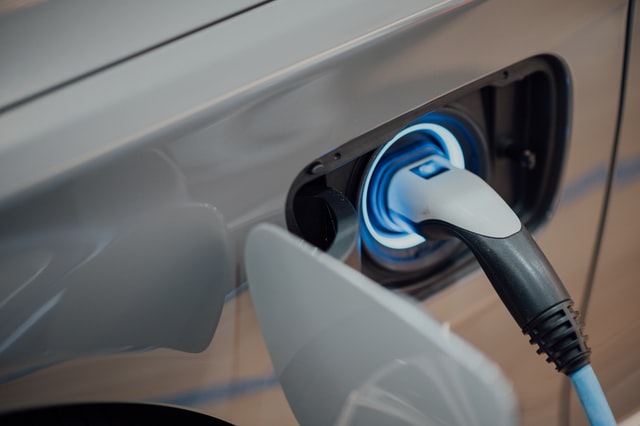Key Findings
- There are over 1.6 million home electric vehicle (EV) charges in the United States
- Riverside, CA has the highest percentage (20%) of households with EV chargers installed
- Outside of California, Atlanta, GA is the metro with the highest percentage of single-family homes equipped with EV chargers (8.5%)
- Texan metros surrounding Houston and Austin have a high level of EV registrations, but EV chargers remain a rarity (1-2% of households)
- Despite having one of the largest EV fleets (≈100,000), New York City has one of the lowest (0.5%) concentrations of home chargers
- Only 142 cities out of the biggest 500 currently have real estate listings with EV chargers, accounting for 0.5% of inventory
Recent figures suggest there are an estimated 1.8 million electric vehicles — both fully battery-operated and plug-in hybrids — in the United States. There are an estimated 53,000 public charging stations.
At 33 electric cars per charger, this ratio appears unsustainable, which is probably why conversations about electronic vehicle (EV) adoption tend to focus on expanding public charging facilities. And rightly so, as 30% of Americans who might be interested in switching to electric cars cannot currently charge them anywhere near their homes.
“…numerous surveys confirm that EV drivers predominantly charge their vehicle at home, as opposed to a public charging station.”
This is a problem, given numerous surveys confirm that EV drivers predominantly charge their vehicle at home, as opposed to a public charging station. The International Council on Clean Transportation estimates there are currently 1.6 million homes with EV chargers.
In this article, we examine which cities in the United States are making the greatest strides in residential EV charging installations — a key element of success for EV adoption at a national scale.
California All the Way: An Estimated One in Five Homes in Riverside, CA Have EV Chargers
While it’s unsurprising that California leads the way in EV adoption by almost every metric out there, the scale at which cities in the state adopt new trends is astonishing. According to our estimates, 20% of all households in Riverside have an EV charger.
“…roughly only 0.5% of all real estate listings inside America’s biggest 500 cities featured an EV home charger.”
In the Bay Area cities of San Francisco and San Jose, around 15-16% of homes have EV chargers, based on the EV adoption figures for these cities. In Los Angeles, a city with by far the highest number of EVs registered (≈307,000), that percentage is 8.6% home adoption.
Of all the cities outside the Golden State, it’s Atlanta, GA that has the greatest concentration of home EV charging installations. Roughly one in 12 households in the city are estimated to have an electric car charger.
The only other non-California cities in the top 10 are Seattle, WA, where 6.3% of households have EV chargers installed are Washington (5.8%) and Boston, MA (4.9%)
Why Is California Winning at Electric Vehicle Adoption?
What is it that makes California a leader in EV adoption? According to a RecurrentAuto’s report, it’s a mixture of factors, most important of which are:
- Local government tax incentives and rebates for EV buyers
- Government-backed development of public charging infrastructure
- Favorable climate, where electric cars can maximize their range without wasting battery on heating and cooling
And, let’s not forget, California as a state is among the most affluent in the country (especially its coastal cities).This suggests locals are more likely to be able to afford an EV and a charger installation in their homes.
Still Some Way To Go: Metros Where Home Charging Is Least Prolific
Among America’s large metropolitan areas, Memphis, TN, Louisville, KY and Oklahoma City, OK have the lowest percentage of homes with electric car chargers (0.4%).
That said, the percentage of EV car adoption in these cities (as well as most cities) is very low.
The New York Exception
Then there is New York City, which finds itself 6th from the bottom of lowest EV home chargers, with just over 0.5% of homes having EV chargers. Why? The structure of the city’s housing is likely to blame. Seeing how 57% of New York’s housing are apartment blocks and other multi-family homes, installing a dedicated EV charging station isn’t an option for most residents.
Wondering what the situation is like in other big cities? Check our interactive table below.
How Much Does it Cost To Install an EV Charger?
Much like with all kinds of installations, the costs associated with installing an EV charger in your home depends on:
- Where you live
- The type of charger you need
- The complexity of the installation required
The cost of EV charger home installation tends to run within a wide range. The numbers show $700 and $3,000 are the extreme ends of installation cost.
For more information, check out our relative price guide for installing a charging station in your home.
As far as home improvements projects go, this one isn’t going to set homeowners back quite as much as renovating a room, but will certainly cost more than a typical electrical job, like installing wiring or a circuit breaker.
Does Having an EV Charger Increase Home Value? It’s Too Early To Tell
It’s gradually becoming true that electric cars are here to stay, so it only makes sense that homes that come with EV chargers installed would be more desirable and therefore more expensive.
That may well become the case, but for now, it’s hard to tell. Similar to our studies of homes with pools or solar panels, we crawled real estate listings in America’s 500 biggest cities for homes with electric car chargers.
We found only 522 EV home chargers. Or in other words, roughly only 0.5% of all real estate listings inside America’s biggest 500 cities featured an EV home charger.
The picture we see here mirrors our findings above: Californian cities are ahead of the rest, with a handful of bigger cities like Atlanta, Seattle, Las Vegas somewhere in the mix.
Sure enough, homes with electric car chargers were more expensive than the average home listing in the same city. That said, it appears that homes with EV chargers are firmly in the premium segment, which makes estimating the value an installation adds more complicated.
“The cost of EV charger home installation tends to run within a wide range. The numbers show $700 and $3,000 are the extreme ends of installation cost.”
Other studies reach similar conclusions. Realtor.com’s 2020 study found that homes in ZIP Codes with more public charging facilities were valued higher. However, the study points out that it’s likely that public charging is more widespread in wealthier areas, where homeowners can afford more expensive electric cars.
There’s also some evidence from the UK, where one study found that homes with EV chargers sold for 13% above the average local listing price. Whether a similar ratio will translate to the U.S. real estate market remains to be seen.
It is also worth noting that EV ownership, and by extension home charging, is yet to become mainstream enough to register significantly in the real estate inventories. There’s little realistic doubt that this data will change soon. But for now, the evidence of mass EV charging installations boosting home prices is not as strong as the evidence that EV services are still lacking institutional support.
Sources and Methodology
The percentage of households that have EV chargers was estimated using EV registration figures from The International Council on Clean Transportation.
The a typical number of cars per household in each metro/city was taken from the American Community Survey, as available via IPUMS.
The share of homes with EV chargers was calculated by comparing the number of real estate listings with EV chargers in each of America’s 500 most populated cities against the total number of real estate listings on Trulia, a licensed real estate brokerage firm.
The cost of EV charger installation was estimated using figures from Porch and NeoCharge.
Our definition of “EV” includes both fully electric, battery-powered vehicles and plug-in hybrid vehicles with chargeable batteries.
Photo by CHUTTERSNAP on Unsplash



